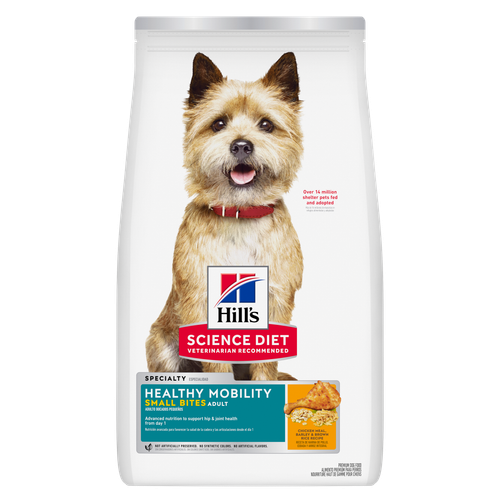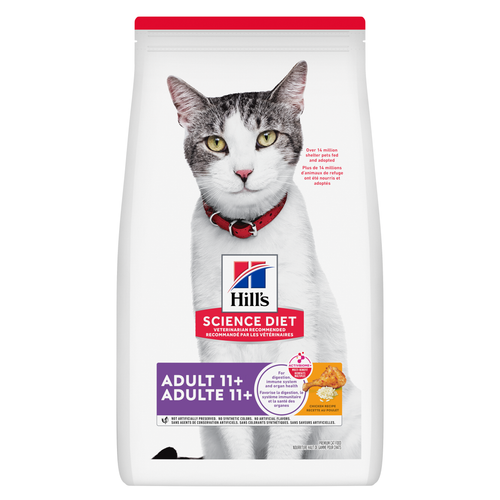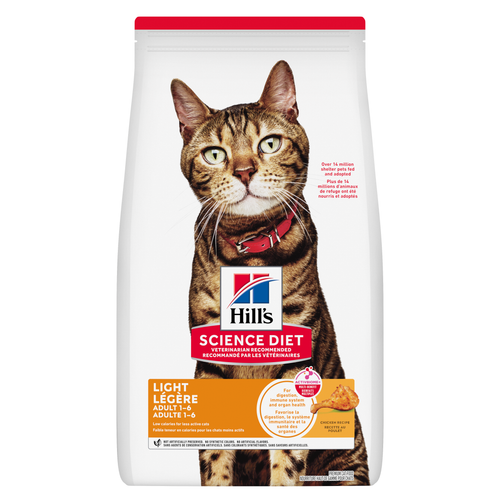
-
Find the right food for your petTake this quiz to see which food may be the best for your furry friend.Find the right food for your petTake this quiz to see which food may be the best for your furry friend.Featured products
 Adult Healthy Mobility Small Bites Chicken Meal, Barley & Brown Rice Recipe Dog Food
Adult Healthy Mobility Small Bites Chicken Meal, Barley & Brown Rice Recipe Dog FoodAdvanced nutrition to support hip & joint health from day 1
Shop Now Adult Sensitive Stomach & Skin Small & Mini Chicken Recipe Dog Food
Adult Sensitive Stomach & Skin Small & Mini Chicken Recipe Dog FoodHill's Science Diet Sensitive Stomach & Skin Small & Mini dry dog food is tailored nutrition for Small & Mini dogs while being gentle on stomachs. Nourishes skin & promotes a lustrous coat.
Shop Now Adult Light Large Breed Chicken Meal & Barley Recipe Dog Food
Adult Light Large Breed Chicken Meal & Barley Recipe Dog Food18% lower calories vs. Science Diet Large Breed Adult
Shop NowFeatured products Adult 11+ Chicken Recipe Cat Food
Adult 11+ Chicken Recipe Cat FoodSupports brain health & beautiful fur. Helps keep immune system, heart & kidneys healthy.
Shop Now Adult Light Chicken Recipe Cat Food
Adult Light Chicken Recipe Cat Food20% lower calories vs. Hill's Science Diet Adult
Shop Now Adult Healthy Cuisine Seared Tuna & Carrot Medley Cat Food
Adult Healthy Cuisine Seared Tuna & Carrot Medley Cat FoodDelicious seared tuna paired with tender carrots in a mouthwatering sauce
Shop Now -
Dog
- Dog Tips & Articles
-
Health Category
- Weight
- Food & Environmental Sensitivities
- Urinary
- Digestive
- Joint
- Kidney
- Dental
- Cancer
-
Life Stage
- Puppy Nutrition
- Adult Nutrition
- Senior Nutrition
Cat- Cat Tips & Articles
-
Health Category
- Weight
- Skin & Food Sensitivities
- Urinary
- Digestive
- Kidney
- Dental
- Stress
- Cancer
-
Life Stage
- Kitten Nutrition
- Adult Nutrition
Featured articles Water
WaterDiscover why water is the most important nutrient for your dog or cat to live a healthy life. Find out how much water your pet should consume each day.
Read More Antioxidants
AntioxidantsUnderstand the importance of antioxidants in your dog or cat's food, and how they can help protect your pet and keep them healthy.
Read More Importance of DHA in your Pet's Food
Importance of DHA in your Pet's FoodLearn about DHA, Docosahexaenoic Acid, a natural omega-3 fatty acid that is essential in the development of the brain and nervous system in cats & dogs.
Read More -


It's a familiar scene: The package you've been anxiously awaiting finally arrives, you take out the cool new purchase, and your cat ... sits in the box. Why do cats like cardboard so much? Is it just for fun, or is there a scientific reason for the relationship between cats and cardboard boxes? It's a bit of both, actually.
Why Do Cats Like Cardboard Boxes?
Cats are quirky — it's one of the qualities that makes them so lovable. They spy on you, stare at walls and spend hours curled up in small spaces. Their favorite place? A box. Essentially, boxes are secure places where they can seek refuge from the environment and predators. And it's not just cardboard boxes; cats also like to hide in other small spaces such as under beds, in the back of closets and even in sinks.
Shelter
You think of your cat as a bundle of fur that you can hold in your lap and cuddle. In their mind, however, they're a big cat prowling the savanna and need a hideout. "Cats simply like to squeeze themselves into small spaces where they feel safe and secure," explained the Cummings School of Veterinary Medicine at Tufts University. "For them, it is far better than being exposed to danger in wide-open spaces." Boxes also provide warmth similar to what kittens receive from their moms. If your fur baby has a specific napping box, place a blanket or towel in it for maximum comfort.

Instinct
Cats love their creature comforts, but they are natural predators and retain their wild instincts even when they're hanging out with their humans in climate-controlled homes. Cats are pouncers and will hide in a box to stalk their prey, noted Pet Health Network — and that prey is usually your feet. Feel free to offer your cat a feather toy or other prey-like toy instead.


Tasty Tips
Stress Relief
Because the relationship between cats and cardboard boxes is rooted in comfort, organizations like Best Friends Animal Society recommended setting up a box (with entrance holes on at least one side) as a hiding spot where newly adopted cats can feel safe while acclimating to their home. The security of a snug spot with sturdy walls helps reduce the stress associated with a new living environment.
And now there's science to back up this observation. According to a study published in Applied Animal Behaviour Science, the boxes do, indeed, help to reduce stress.
The study found that shelter cats given cardboard box hiding spots adapted more quickly to their environment change than those cats without boxes, reaching the conclusion that "the hiding box appears to be an important enrichment for the cat to cope effectively with stressors in a new shelter environment the first weeks after arrival." This is great news for pet parents, knowing that a seemingly simple cardboard box can offer so much relief.

For the Fun of It
Scientific evidence aside, there's no denying that cats like to hang out in boxes just for fun, too. Boxes are places where kitties can sleep, sit and play. Why do cats like cardboard, in particular? They can chew or scratch the sides and not get in trouble for it like when, say, they use the couch as a scratching post.
Why Does My Cat Like A Cardboard Box More Than Their Carrier?
We've already identified that cats like small, dark spaces to hide away to make them feel safe and secure, which you would think would be a good description of a cat kennel or carrier. However, the last time you even got your cat carrier out of the closet your cat took off running to hide in one of their secret spots? So, why do cats have such an aversion to a kennel or a carrier. Well, the short answer is that cats are smart creatures and have good memories. Cats can recall the last association with that cat carrier, which might have been a trip to the vet or moving that they didn't love so much. Check out this article on how to get your cat used to their cat carrier.
New cat parents should stock up on several cardboard boxes and strategically place them around the house (hide-and-seek, anyone?) as a form of enrichment.
Before tossing your cardboard boxes into the recycling bin, consider whether it will make the perfect play place for your furry friend!


Christine O'Brien is a writer, mom, and long-time cat parent whose two Russian Blues rule the house. Her work also appears in Care.com, What to Expect, and Fit Pregnancy, where she writes about pets, pregnancy, and family life. Find and follow her on Instagram and Twitter @brovelliobrien.
Related products

With delicious chunks in a decadent gravy

Supports brain health & beautiful fur. Helps keep immune system, heart & kidneys healthy.

Delicious seared tuna paired with tender carrots in a mouthwatering sauce

20% lower calories vs. Hill's Science Diet Adult
Related articles

Discover how to train your cat, starting with very basic first steps that both reward good behavior and discourage the bad.

Discover the benefits of Hill's line of kitten foods and how they provide complete and balance nutrition for growing kittens.

When you adopt a cat, you don't just gain a best friend; you also save her life. Here's why getting a cat from a local animal shelter makes so much sense.

Cats are naturally very clean and chances are your kitten will already have learned how to use the litter box from her mother before she comes to live with you.

Put your cat on a diet without them knowing
Our low calorie formula helps you control your cat's weight. It's packed with high-quality protein for building lean muscles, and made with purposeful ingredients for a flavorful, nutritious meal. Clinically proven antioxidants, Vitamin C+E, help promote a healthy immune system.
Put your cat on a diet without them knowing
Our low calorie formula helps you control your cat's weight. It's packed with high-quality protein for building lean muscles, and made with purposeful ingredients for a flavorful, nutritious meal. Clinically proven antioxidants, Vitamin C+E, help promote a healthy immune system.

